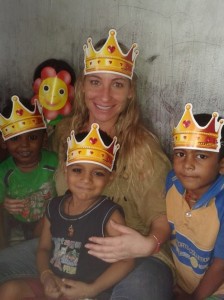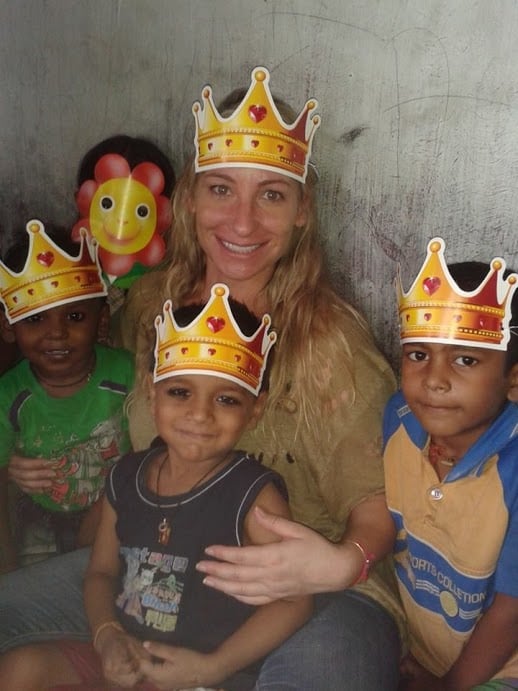
Leyla Sandler with students.
It must be in her DNA. Leyla Sandler, LCSW, spends her life helping others, whether in her “day job” or when she has “time off.”
Sandler’s “day job” is spent as an investigative social worker on child abuse cases in Washington, D.C.
Her recent “time off” was spent with the American Jewish Joint Distribution Committee (JDC) teaching children who live in abject poverty in India.
“JDC does shortterm service trips for about two months in various parts of the world,” says Sandler, a Norfolk native.
The India trip is in conjunction with the Gabriel Project, Mumbai (GPM). It regularly sends “Jewish young adults, ages 18–35, on a comprehensive two month volunteer and learning program in Mumbai, India, through the JDC Entwine Global Jewish Service Corps (JSC) program,” according to its website.
During the program, participants, such as Sandler, provide literacy and nutrition assistance for children living in the slums.
“For some people, they saw the poverty. I see it everyday in D.C. There are poor people everywhere. The difference is that in the United States it might be a few blocks at a time, but in Mumbai, there are miles and miles of it.”
Armed with lessons plans developed each evening, the JDC participants travel by train every morning to the slums where they divide into groups of two or three volunteers. Each group, Sandler says, goes to two or three makeshift classrooms each day to teach and help the children. Each group is supposed to include a male for security (although that isn’t always the case), a translator and an instructor. A typical workweek of Monday through Friday is spent in the slums from 8 am until 2 pm.
Making teaching even more challenging, because the classes are created by proximity, not by age or grade level, ages vary widely in each class. “It is not unusual to have a class with kids from three years old to 10 years old,” says Sandler.
In creating the lesson plans, Sandler says they picked a theme for each week, with Friday culminating in a fun, educational activity. The GPM staff helps volunteers make the lesson plans, based on a set curriculum. Volunteers interact and play with the children and help teach English, science and math.
“The kids loved having us there,” says Sandler. It is really empowering to them to have the attention.”
Sandler says that in addition to having their children gain some education, mothers have two incentives for sending their kids to the classes. First, the parents have time to work, and second, the children get a free, nutritious lunch.
As tough as the circumstances might be, Sandler says, she “loves international aid work.” With her family, during other JDC missions, she traveled to Haiti after the earthquake to assist with the disaster. And, after one JDC mission, she and her siblings donated the money for and built a school in Ethiopia.
But, international aid work is not for everyone, Sandler says. “It’s hard. It takes years, if not generations to promote and enact change. Some volunteers get disappointed.
“Issues are big and small everywhere,” she says. “For me, it’s great to be able to give, and not just in your own community.”
Sandler says she participates in these programs because she feels that just “showing interest in a child, giving that extra hug, teaching something, making a difference for one day, might impact an entire life.
“You never know the impact you can have on a child’s life,” she says. “To have the opportunity to potentially positively impact one person makes it all worth it.”
For information on these and other JDC programs, go to www.jdc.org/get-involved/. The American Jewish Joint Distribution Committee (JDC) is a recipient of funds from United Jewish Federation of Tidewater.
by Terri Denison

